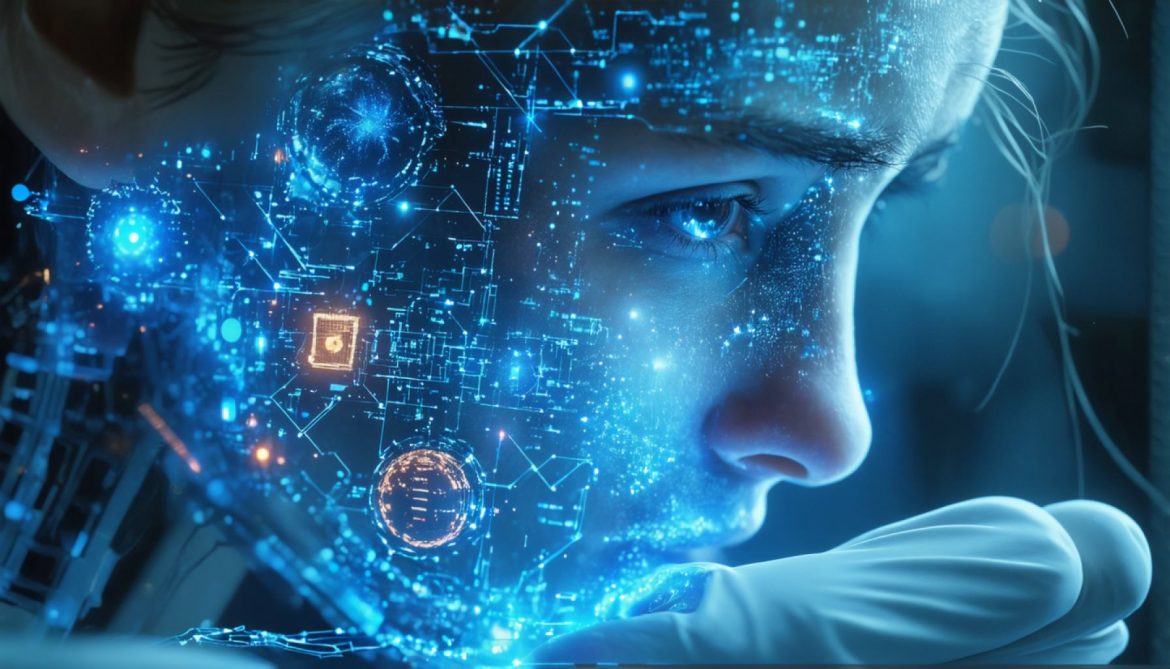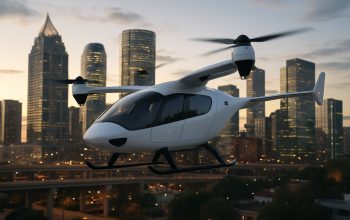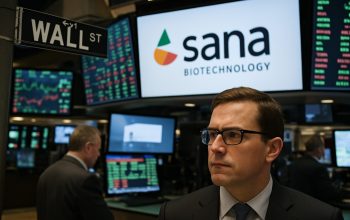- The fusion of artificial intelligence and biotechnology is transforming medical science, with AI predicting diseases and personalizing treatments.
- The AI in Biotechnology Market is projected to grow from USD 2.50 Bn in 2025 to USD 8.56 Bn by 2032, with an annual growth rate of 19%.
- Companies like AstraZeneca and Pfizer, alongside startups such as Recursion Pharmaceuticals, are leading innovations in AI-driven drug discovery and clinical trials.
- Despite facing challenges like high costs and regulatory hurdles, companies are employing strategic solutions to advance the field.
- North America leads the market, with Europe and Asia-Pacific making significant contributions as well.
- The convergence of AI and biotech signifies a transformative era in healthcare, emphasizing anticipation, personalization, and accessibility.
- Collaboration among scientists, technologists, and policymakers is crucial to realizing the potential of this AI-biotech synergy.
In the quiet hum of laboratories worldwide, a revolution is underway. The fusion of artificial intelligence and biotechnology is poised to reshape the fabric of medical science. Picture this: a future where AI-powered algorithms predict diseases before symptoms arise, crafting personalized treatment plans that dramatically increase survival rates. By 2032, the AI in Biotechnology Market is projected to leap from a valuation of USD 2.50 Bn in 2025 to a staggering USD 8.56 Bn, growing at a vigorous 19% annually.
But what fuels this astronomical growth? As companies like AstraZeneca, Pfizer, and burgeoning startups like Recursion Pharmaceuticals innovate furiously, AI stands as a pivotal force behind next-gen drug discovery and clinical trials. Envision AI models sifting through vast oceans of data faster and with more precision than the human mind can fathom—illuminating pathways for new treatments and amplifying the efficacy of everything from gene editing to medical imaging.
The dynamics are breathtakingly complex. With the convergence of digital transformation and skyrocketing R&D investment, AI is not only a tool but an integral player in the ecosystem of biotechnology. Yet, the journey is not devoid of challenges. High costs, regulatory labyrinths, and a dearth of skilled analysts pose formidable hurdles. However, companies are tackling these with nimble strategies, pioneering workforce development programs, and fostering cross-sector collaborations, ensuring resilience and adaptability in the uncharted future.
Geographically, North America holds the reins as the leading market, with Europe and Asia-Pacific hot on its trail. Each region, from the tech-savvy corridors of Silicon Valley to the innovation hubs in Berlin and Tokyo, contributes uniquely to this relentless march toward a new era in healthcare.
As we stand on the cusp of this technological evolution, a critical takeaway emerges: the convergence of AI and biotechnology is not merely an incremental improvement—it’s the dawn of a transformative age. By harnessing smart algorithms, we are not only enhancing the efficacy of medical interventions but also moving toward a future where healthcare is anticipatory, personalized, and universally accessible.
The intrigue and promise of AI in biotechnology suggest a narrative of optimism. It invites us to imagine a future defined not by the limitations of today’s medical practices but by the boundless possibilities unlocked by this powerful synergy. As scientists, technologists, and policymakers join forces, they craft the architecture of a new world—one where the ideal of timely and efficient care becomes a tangible reality.
The Dawn of AI-Powered Healthcare: Exploring New Frontiers in Biotechnology
What Drives the Surge in AI-Biotechnology Integration?
The global market for AI in biotechnology is forecasted to catapult from USD 2.50 billion in 2025 to a staggering USD 8.56 billion by 2032. This explosive growth is driven by innovative strides made by industry giants like AstraZeneca and Pfizer, alongside forward-thinking startups such as Recursion Pharmaceuticals. As these entities harness AI to enhance drug discovery, clinical trials, and medical imaging, they spearhead a new era marked by unprecedented healthcare solutions.
Emerging Trends and Market Dynamics
1. Digital Transformation: The marriage of AI with digital technologies facilitates the precise analysis of vast datasets, significantly improving the accuracy of diagnostics and treatment plans.
2. Increased R&D Investment: Robust research and development efforts fuel advancements in gene editing, disease prediction, and individualized patient care approaches, putting AI at the forefront of cutting-edge healthcare solutions.
3. Cross-Sector Collaborations: Companies are building strong partnerships across sectors, fostering a culture of innovation and resilience crucial for overcoming challenges in regulation and analyst shortages.
4. Geographic Lead: North America leads the pack in AI-biotechnology integration, owing to strong infrastructure and a thriving tech ecosystem. However, regions like Europe and Asia-Pacific are rapidly gaining ground.
Real-World Applications of AI in Biotechnology
1. Disease Prediction and Prevention: AI models can accurately forecast disease outbreaks and individual patient risks before physical symptoms manifest, allowing preemptive interventions.
2. Personalized Medicine: By creating tailored treatment plans based on an individual’s genetic profile and health history, AI optimizes therapeutic outcomes and minimizes side effects.
3. Drug Discovery and Development: Accelerating the identification of potential drug candidates by simulating millions of chemical reactions, AI shortens the time from lab research to market availability.
How To Integrate AI into Healthcare Practices
1. Invest in Training: Develop a skilled workforce fluent in AI technologies by investing in education and training programs.
2. Foster Agile Partnerships: Build alliances with tech firms and research institutions to drive innovation and development.
3. Prioritize Ethics and Regulation: Navigate the complex regulatory landscape effectively by integrating ethics and compliance into AI development and deployment strategies.
Controversies and Limitations
While AI in biotechnology promises vast improvements, it also presents challenges such as the high costs of developing technologies, navigating stringent regulatory frameworks, and addressing data privacy concerns. Furthermore, AI models require extensive input data for accuracy, which raises questions about data collection and consent.
Predictions and Future Directions
1. Regulatory Evolution: As AI becomes deeply ingrained in biotech, expect regulatory bodies to evolve their frameworks to accommodate new technologies more swiftly and efficiently.
2. Wider Accessibility: The convergence of AI and biotechnology portends a future where personalized, preventative healthcare is no longer a luxury but a universal reality.
3. Expanded Applications: Innovations are likely to extend into areas such as mental health, rare diseases, and holistic health analytics.
Quick Tips for Stakeholders
– Healthcare Professionals: Stay updated with the latest AI technologies and upgrade skills regularly to remain competitive in the evolving landscape.
– Investors: Monitor AI and biotech convergence trends to identify opportunities for impactful investments.
– Policymakers: Engage in discourse with tech and healthcare leaders to craft policies that align with advancements while protecting public interest.
Readers interested in further exploration of this dynamic intersection between AI and biotechnology can discover more insights on AstraZeneca, Pfizer, and Recursion Pharmaceuticals.



